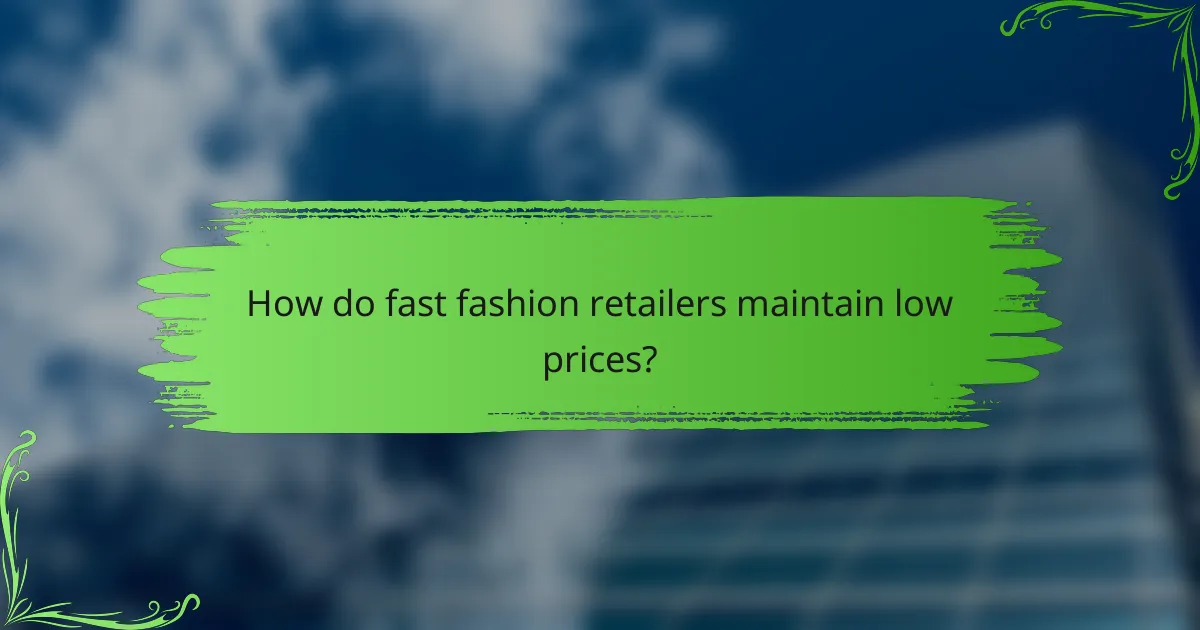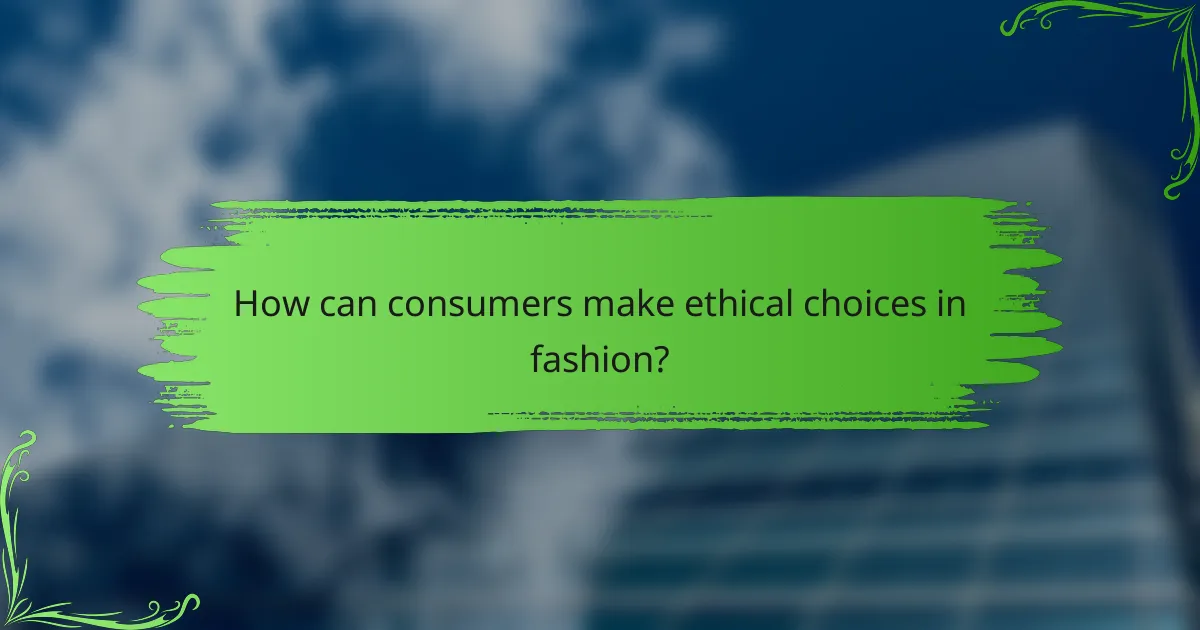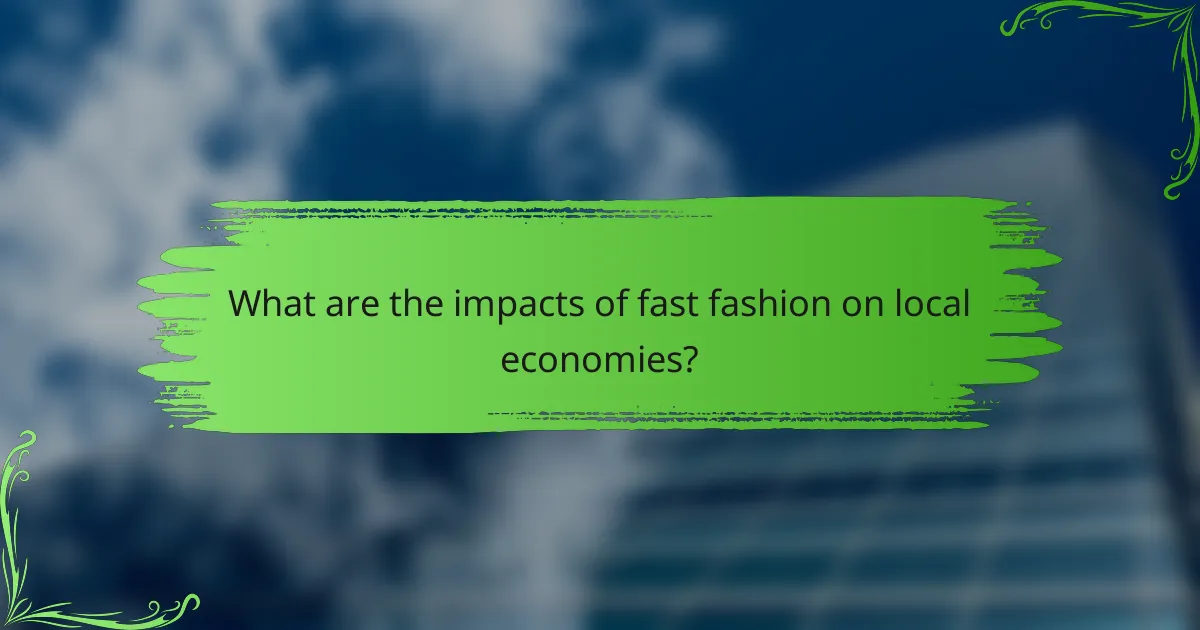Fast fashion retailers are increasingly scrutinized for their ethical practices, particularly concerning labor exploitation and environmental degradation. By prioritizing low costs and rapid production, these companies often create high-pressure work environments that result in low wages and unsafe conditions for workers. As a result, the allure of trendy, affordable clothing comes at a significant ethical cost.

What are the ethical concerns of fast fashion retailers?
Fast fashion retailers face significant ethical concerns, primarily related to their environmental impact, labor exploitation, and the promotion of consumerism and waste. These issues arise from the rapid production cycles and low-cost strategies that prioritize profit over ethical practices.
Environmental impact
The environmental impact of fast fashion is profound, contributing to pollution, resource depletion, and waste generation. The production processes often involve toxic chemicals and dyes that contaminate water sources, while the fast-paced manufacturing leads to significant carbon emissions.
Additionally, the fast fashion model encourages a throwaway culture, where garments are discarded after minimal use. This results in millions of tons of textile waste ending up in landfills each year, exacerbating environmental degradation.
Labor exploitation
Labor exploitation is a critical concern in the fast fashion industry, where workers, often in developing countries, face low wages and poor working conditions. Many employees earn below the minimum wage, working long hours in unsafe environments without proper labor rights.
Reports indicate that some factories may not comply with basic safety regulations, putting workers at risk. This exploitation is driven by the industry’s demand for cheap production to maintain low retail prices, often at the expense of human dignity and rights.
Consumerism and waste
Fast fashion fuels consumerism by promoting a cycle of constant purchasing and disposal of clothing. This encourages individuals to buy more than they need, often leading to regret and waste. Many consumers are unaware of the environmental and social costs associated with their purchases.
To combat this issue, consumers can adopt more sustainable practices, such as buying second-hand clothing, supporting ethical brands, and practicing mindful consumption. By making informed choices, individuals can help reduce the demand for fast fashion and its associated ethical concerns.

How do fast fashion retailers maintain low prices?
Fast fashion retailers keep prices low through a combination of outsourcing production, using inexpensive materials, and implementing high-volume sales strategies. These practices allow them to quickly produce trendy clothing at minimal costs, appealing to budget-conscious consumers.
Outsourcing production
Fast fashion brands often outsource production to countries with lower labor costs, such as Bangladesh, Vietnam, and India. This strategy significantly reduces manufacturing expenses, allowing retailers to offer lower prices to consumers.
However, outsourcing can lead to ethical concerns, including poor working conditions and low wages for factory workers. Many brands face scrutiny for not ensuring fair labor practices in their supply chains.
Use of cheap materials
To maintain low prices, fast fashion retailers frequently use inexpensive materials like polyester and cotton blends. These materials are often less durable and can contribute to environmental issues, such as increased waste and pollution.
While cheap materials help keep production costs down, they may compromise the quality and longevity of the garments. Consumers should consider the trade-off between price and sustainability when making purchases.
High-volume sales strategy
Fast fashion retailers rely on a high-volume sales strategy, producing large quantities of clothing to maximize profits. This approach allows them to benefit from economies of scale, reducing per-unit costs.
By frequently introducing new styles and collections, these brands create a sense of urgency among consumers, encouraging quick purchases. However, this can lead to overconsumption and contribute to the fast fashion cycle, where items are often discarded after only a few wears.

What are the working conditions in fast fashion factories?
The working conditions in fast fashion factories are often characterized by long hours, low wages, and inadequate safety measures. Workers frequently face high-pressure environments that prioritize speed and cost over their well-being.
Long hours and low wages
Employees in fast fashion factories typically work extensive hours, often exceeding 60 hours a week, with little to no overtime compensation. Wages are frequently below the living wage, with many workers earning just enough to survive, often in the range of a few hundred dollars per month.
This financial strain can lead to a cycle of poverty, where workers are unable to afford basic necessities, forcing them to work even longer hours to make ends meet. The pressure to meet production targets exacerbates this situation, as workers fear losing their jobs if they do not comply.
Lack of safety regulations
Fast fashion factories often operate with minimal safety regulations, putting workers at risk of accidents and health issues. Common hazards include exposure to toxic chemicals, inadequate ventilation, and unsafe machinery.
Many factories lack proper fire safety measures and emergency exits, which can lead to tragic incidents. Workers are frequently discouraged from reporting unsafe conditions due to fear of retaliation or job loss.
Limited workers’ rights
Workers in the fast fashion industry often have limited rights and protections. Labor unions are rare, and when they do exist, they may face significant opposition from management. This lack of representation makes it difficult for workers to advocate for better conditions or fair treatment.
Additionally, many fast fashion brands operate in countries with weak labor laws, allowing companies to exploit loopholes and avoid accountability. As a result, workers may find themselves trapped in a cycle of exploitation with few avenues for recourse.

How can consumers make ethical choices in fashion?
Consumers can make ethical choices in fashion by prioritizing brands that emphasize sustainability, opting for second-hand clothing, and supporting fair trade initiatives. These actions help reduce the negative impact of fast fashion, which often involves unethical labor practices and environmental harm.
Choosing sustainable brands
Selecting sustainable brands is crucial for making ethical fashion choices. Look for companies that use eco-friendly materials, implement fair labor practices, and maintain transparency in their supply chains. Brands that are certified by organizations like Global Organic Textile Standard (GOTS) or Fair Trade are often more reliable.
Consider the lifecycle of the products you buy. Sustainable brands typically focus on durability and recyclability, which can save you money in the long run. Check for labels that indicate the use of organic cotton, recycled materials, or low-impact dyes.
Buying second-hand clothing
Purchasing second-hand clothing is an effective way to reduce waste and lessen the demand for new fast fashion items. Thrift stores, consignment shops, and online platforms like Poshmark or Depop offer a wide variety of styles at lower prices, allowing you to find unique pieces while being environmentally conscious.
When buying second-hand, inspect items carefully for quality and condition. This practice not only supports sustainable consumption but also helps extend the lifecycle of garments, reducing the overall environmental impact of the fashion industry.
Supporting fair trade initiatives
Supporting fair trade initiatives is essential for promoting ethical practices in the fashion industry. Fair trade organizations ensure that workers receive fair wages and work in safe conditions. Look for products that carry fair trade certifications, which indicate adherence to these standards.
Engaging with brands that prioritize fair trade can help shift the industry towards more ethical practices. Consider making purchases from local artisans or cooperatives that focus on fair trade, as this not only supports ethical labor but also contributes to local economies.

What are the impacts of fast fashion on local economies?
Fast fashion significantly affects local economies by creating low-wage jobs while often leading to exploitation and undermining local businesses. This industry model prioritizes rapid production and low costs, which can have both positive and negative consequences for communities.
Job creation vs. exploitation
Fast fashion retailers often claim to create numerous jobs in developing countries, providing employment opportunities to many. However, these jobs frequently come with poor working conditions, long hours, and minimal pay, leading to exploitation rather than sustainable employment.
Workers may earn wages that are below the living wage, making it difficult for them to support their families. This creates a cycle of poverty, where the promise of job creation does not translate into economic stability for workers.
Impact on local artisans
The rise of fast fashion can negatively impact local artisans who rely on traditional craftsmanship. As mass-produced clothing floods the market, unique, handmade items often struggle to compete on price and availability.
This shift can lead to a decline in local craftsmanship and cultural heritage, as artisans may be forced to abandon their trades in search of more stable income sources. Communities lose not only their economic diversity but also their cultural identity.
Economic dependency on low-wage labor
Fast fashion fosters an economic dependency on low-wage labor, particularly in countries where these retailers set up production. This reliance can stifle local economies, as businesses become accustomed to low-cost labor rather than investing in higher-quality jobs.
As a result, local economies may struggle to develop more sustainable industries, perpetuating a cycle of low wages and limited economic growth. Communities may find themselves trapped in a system that prioritizes cheap labor over long-term prosperity.

What are the alternatives to fast fashion?
Alternatives to fast fashion focus on sustainability, ethical production, and long-lasting quality. These options help consumers reduce their environmental impact while supporting fair labor practices.
Sustainable fashion brands
Sustainable fashion brands prioritize eco-friendly materials and ethical labor practices. Examples include companies like Patagonia and Everlane, which emphasize transparency in their supply chains and use recycled or organic materials.
When choosing sustainable brands, look for certifications such as Fair Trade or Global Organic Textile Standard (GOTS) to ensure ethical practices. Prices may be higher than fast fashion, but the investment often results in higher quality and longevity.
Capsule wardrobes
A capsule wardrobe consists of a limited selection of versatile clothing items that can be mixed and matched. This approach encourages mindful consumption by promoting quality over quantity and reducing the need for frequent purchases.
To create a capsule wardrobe, start with essential pieces that fit your lifestyle, such as a few tops, bottoms, and outerwear. Aim for a cohesive color palette to maximize outfit combinations. This method not only simplifies your wardrobe but also minimizes waste and supports sustainable fashion choices.


